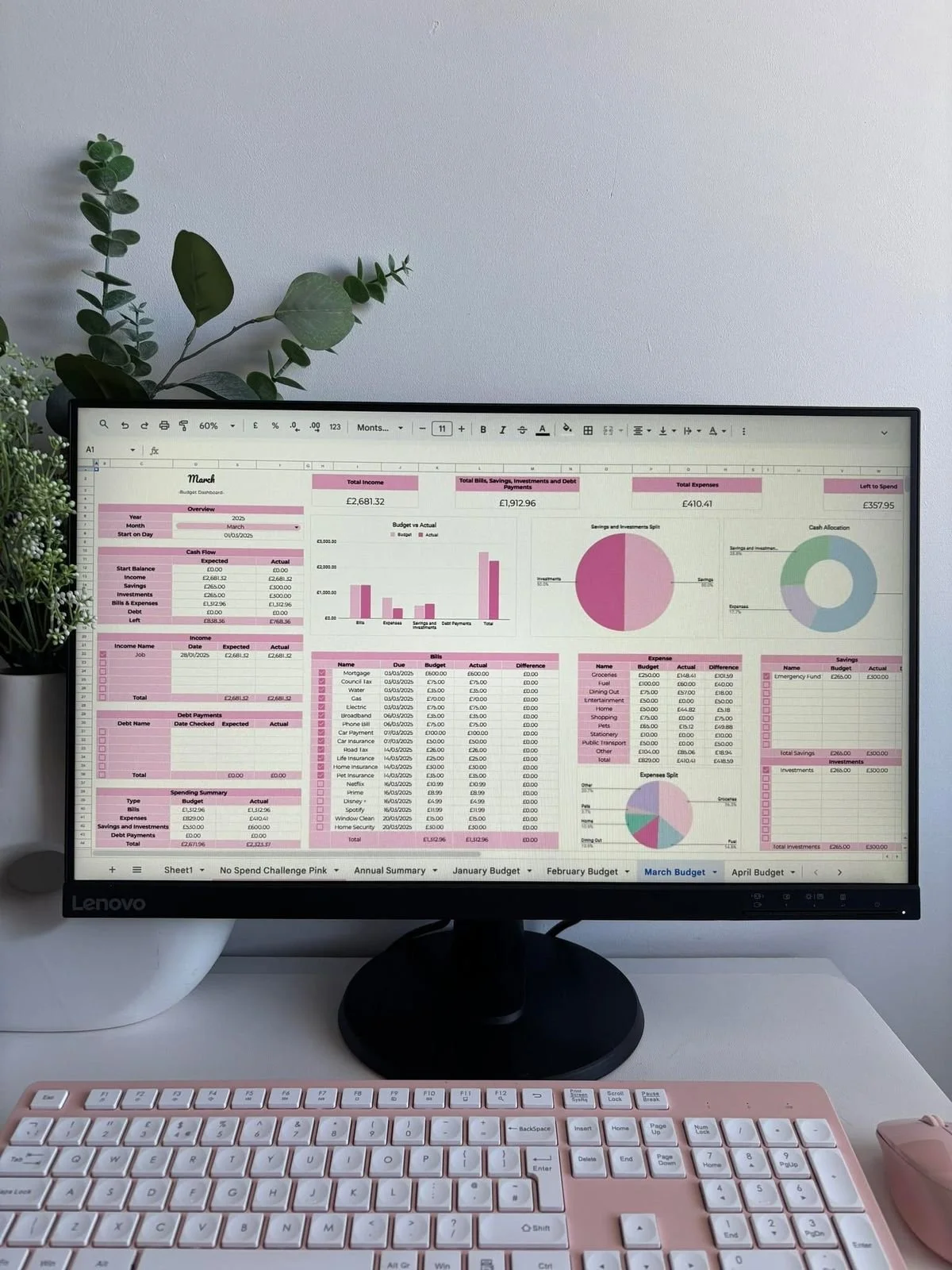3 Reasons Your Budget Isn’t Working (And How to Fix It)
Budgeting is a foundational part of financial wellness, but what happens when you’re doing all the “right” things and it still feels like your budget isn’t working? You’re saving, cutting expenses, and tracking your numbers, yet you still feel broke or anxious.
If that’s you, you’re not alone. And you’re not the problem.
In this post, I’m walking you through three signs that your budget system might be out of sync with your nervous system, values, or current life season—and how to create a budgeting plan that actually works for you.
1. You’re saving less than you planned.
If you consistently fall short of your savings goal, that’s usually a sign that your budget isn’t realistic or your savings strategy isn’t automated.
For example, if your goal is to save $1,000/month but you only manage to save $200 or $500, something’s off. Your budgeting goals might be too aspirational for your current income and expenses.
One simple fix? Try reverse budgeting.
Instead of budgeting based on what you want to save, look at your actual income and decide what’s truly feasible to allocate toward savings each month. Even $50 is better than nothing when it’s automated.
I always tell my clients: treat your savings like a bill. Just like rent, groceries, or your phone bill, your savings deserve a line item in your budget sheet or budgeting tracker.
If you haven’t already, set up a budgeting app or use a budgeting tool that allows for automation. This one step alone can help you build consistency and reduce mental load.
2. Your expenses are always higher than your income.
This is where budgeting basics meet budgeting truth: you cannot budget properly if there is more money going out than coming in.
Many people will say, “just make more money,” but that’s not always possible in the short term. Instead, start by minimizing your current expenses. Most of us are part of a consumer-driven society, and overspending is often driven by survival, status, or self-soothing.
Before you try to increase your income, assess your spending using a wealth tracker or budgeting spreadsheet. Are you spending in alignment with your values? Are you investing in your future self, or reacting to short-term desires?
I recommend reviewing your spending by category—especially if you’re using a budgeting app or a budgeting tracker that syncs with your accounts. One client realized 70% of their “extra” money was going toward takeout. Another discovered they were overspending on subscriptions they didn’t use.
This is where basic budgeting skills like expense auditing can help you get clarity and control.
3. You still feel anxious or confused, even after budgeting.
If you feel worse after looking at your numbers, it’s time to reset your budgeting mindset.
Money anxiety often stems from past experiences, financial trauma, or nervous system dysregulation. That’s why traditional budgeting worksheets or budgeting templates aren’t enough.
You need a budgeting system that feels safe, empowering, and intuitive. Not something that triggers shame or avoidance.
Some tips:
Make it a ritual: Light a candle, put on music, and treat your money check-ins like a date with your future self.
Ground yourself: Do a short meditation or breathwork session before looking at your numbers.
Reflect: Use journaling prompts to unpack what emotions are coming up. Are you feeling fear, guilt, or pressure?
These aren’t just mindset tricks—they’re part of building a nervous-system-informed budgeting plan that actually supports your goals. When you feel tight even with a plan, start here for why money is energy and how to make it move with you.
Still stuck? The issue might be your system.
If spreadsheets make your eyes glaze over, or if you’ve tried five different budgeting tools and still feel lost, the problem might not be you.
The problem might be that your budgeting knowledge and emotional readiness aren’t aligned with your current tools.
That’s why I created the Wealth Well Tracker—a free, intuitive budgeting sheet designed to help you:
Get honest about your numbers
Reflect on your money values
Build emotional resilience
Create a budgeting plan that honors your real life
And if you want to go deeper, check out my free workshop: From Financial Confusion to Clarity.
In this workshop, I break down the 3 biggest mistakes keeping people stuck financially. You’ll learn my holistic framework rooted in mindset, financial literacy, and wealth creation—so you can finally understand your money story and rewrite it confidently.
Both are linked below.
Final thoughts:
You’re not bad with money! You may just need budgeting advice that’s emotionally and energetically aligned.
You also don’t need to hustle harder. You just need a budgeting system that honors YOU.
Explore these free resources:
〰️ LISTEN TO THE PODCAST OR WATCH THE VIDEO
↳ Listen to the full podcast version HERE
↳ Watch the YouTube Video for this blog post HERE
〰️ WORK WITH ME
↳ my coaching services https://bit.ly/3ZAs0NZ
↴ additional resources and perks:
→ Watch my FREE Webinar 'From Financial Confusion to Clarity' - https://bit.ly/4h7dXqq 📺
→ Download my free ebook on mastering your money mindset https://bit.ly/3fAfj33 💵
→ Download my free Wealth Tracker - https://bit.ly/48H8Rxj 🧮
→ Invest in stocks with Wealthsimple https://bit.ly/3PJYscp 📈
→ Invest in crypto and receive $25 USD https://bit.ly/3TxD4dr 🪙
→ Invest like the rich in art and receive a $200 bonus (USD only) https://bit.ly/3Popuqh 🖼️
→ Sign up for my bi-weekly newsletters https://bit.ly/466g09H 📨
〰️ CONTACT ME
✉️ hello@morganblackman.com


